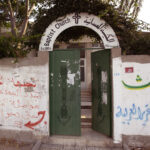
LONDON (BP) – Christians in Iran suffered combined prison sentences amounting to a sixfold increase over time levied in 2023, all as punishment for their faith, London-based religious advocacy group Article 18 said in its latest annual report.
The courts sentenced 96 Christians to a combined 263 years in prison in 2024 on faith-related charges, compared to 22 Christians sentenced in 2023 to a combined 43.5 years, Article 18 said in the report released Jan. 20 in collaboration with Open Doors, CSW and Middle East Concern.

The arrests were made by agents of the Islamic Revolutionary Guard Corps (IRGC), a group U.S. President Donald Trump mentioned Jan. 22 in redesignating the Houthis of Yemen as a foreign terrorist organization. The IRGC supports the Houthis among several terrorist groups, Trump said in flagging the Houthis for attacks on shipping in the Red Sea and on Israel during its war with Hamas.
“The Houthis’ activities threaten the security of American civilians and personnel in the Middle East, the safety of our closest regional partners, and the stability of global maritime trade,” Trump said, but religious liberty in either Yemen or Iran was not noted as a motivator of the designation.
Regarding religious liberty, Article 18 said Iran’s Christians – who number an estimated 800,000 among the country’s nearly 90 million people – suffered emerging trends including lengthy prison sentences, hefty financial fines and the confiscation of property. Combined sentences also included 37 years of exile and nearly $800,000 in fines, the highest annual financial penalty to date, Article 18 reported.
At year’s end in 2024, at least 18 Christians were still serving prison time, the report said. During the year, at least 139 Christian were arrested, 80 were detained, 661 were directly affected by the sentences, and 25 endured imprisonment. Individual sentences were a lot longer, the report said, with five Christians receiving 10-year prison terms and another a 15-year sentence on charges related to their faith.
Financial transactions of Christians and their lawyers were scrutinized in 2024 to uncover any funds received from friends, family members or Christians abroad, the report said.

“Authorities have even told some Christian detainees that ‘foreign hostile states’ including ‘Zionist groups’ are actively supporting Christian organizations in Iran, rationalizing the severe measures taken against Church finances as a matter of ‘national security,’” Article 18 reported.
Iran’s Revolutionary Courts have criminalized tithes, donations and offerings given to support Christian church activities, although such gifts are not criminalized in churches that exclusively serve Armenian and Assyrian-speaking members, the report said.
“While Iran invests in expanding its influence across the region in places like Iraq, Syria, Yemen and Lebanon,” Article 18 reported, “officials interpret any expansion of Christianity within Iran as an analogous threat, justifying further financial suppression.”
The report, “The Tip of the Iceberg,” is so titled because Article 18 contends much persecution against Christians is undocumented, evidenced by newly leaked documents showing persecution of more than 300 Christians in the Tehran region between 2008 and 2023, not included in previous reports.
The 2025 reports detailed the leaked files, offering key insights into systematic persecution of Christians in Iran.
“The documents covered a wide range of judicial proceedings – from criminal cases involving ordinary citizens, to case files of political or religious prisoners of conscience,” Article 18 reported, “which shed light on the darkest corners of the Islamic Republic’s judicial system, offering researchers, experts and members of the public insights into the mindset, decision-making processes, and operational procedures of Iran’s security and judicial apparatus.”
Christians were vilified as members of a sect and a security threat, Christianity was criminalized, Christians were interrogated about their beliefs and forced to recant, the Bible was treated as contraband and evidence of a crime, and charges were brought against Christians for ordinary activities and religious practices such as singing worship songs, the leaked files revealed.
The full report, which details the cases of key Christians, is available here.



















